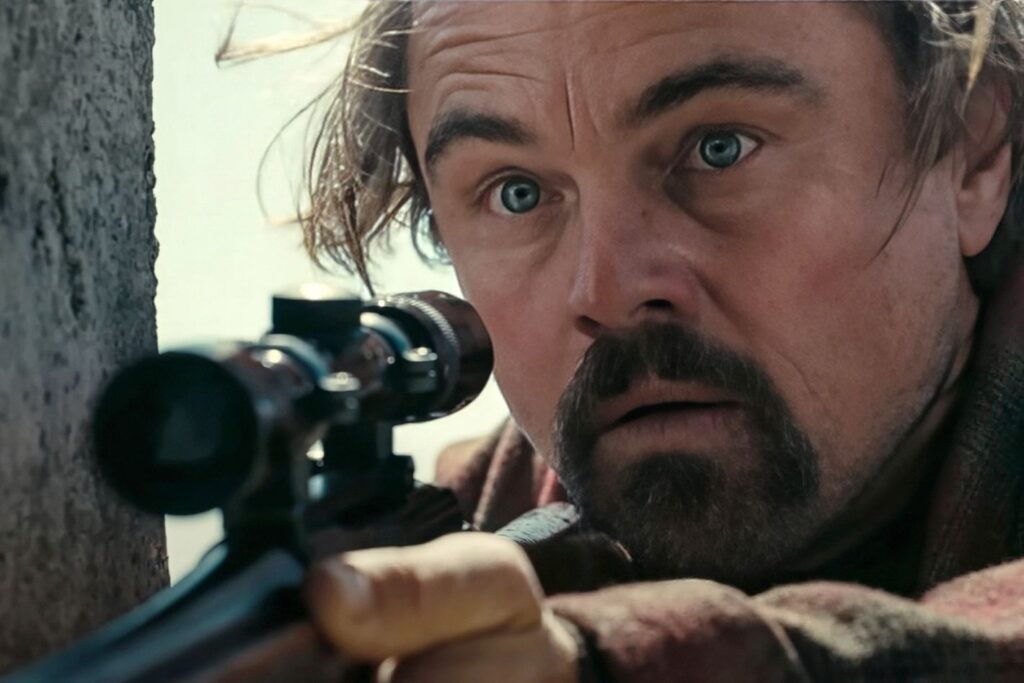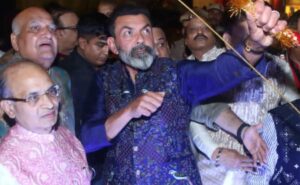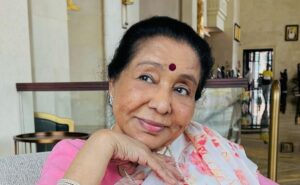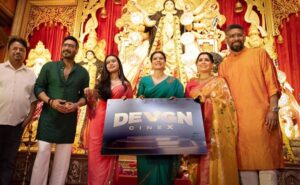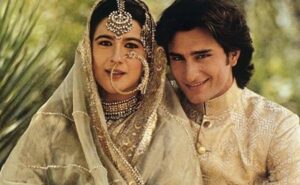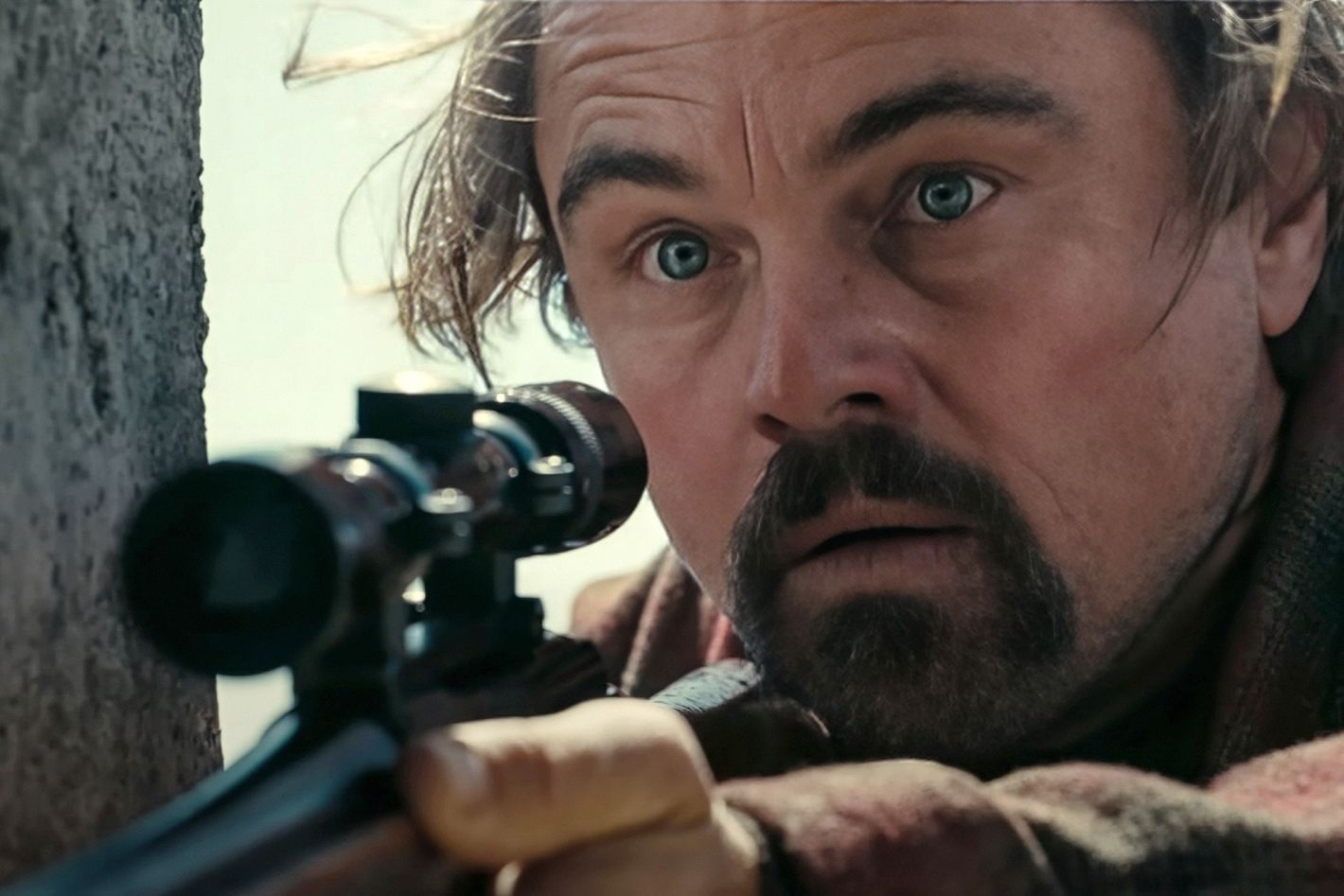
The last five films Leonardo DiCaprio has starred in have all been Oscar-nominated for Best Picture, and it seems fairly certain that Paul Thomas Anderson’s One Battle After Another will add to this run when nominations are announced early next year. Some of this speaks to DiCaprio’s stature in the industry: He is one of the last remaining movie stars, the kind of actor who can instantly get a Big Important Movie green-lit with a Big Important Budget. That’s one reason why heavy-hitter auteurs like Anderson, Quentin Tarantino, and Martin Scorsese like to work with him (aside from the primary reason, which is that he’s an amazing actor). But there’s something else here, too, something about the way that DiCaprio’s style has changed over the years. Somehow, over the past decade or so, he’s become one of our finest comic performers.
Which is itself funny, because it has coincided with the death of theatrical comedies in the U.S. marketplace. Of all the movies DiCaprio has made over this more recent period, only Adam McKay’s Don’t Look Up could be called a true comedy (it’s also, of course, an ambitious and topical satire), and that was a Netflix release. One Battle After Another, Once Upon a Time in Hollywood, and The Wolf of Wall Street all have broadly funny elements, but they’re not really titles that would have wound up in the “comedy” section of the video store back in the days when we had video stores. Still, Leo’s hilarious performance is the glue that holds these movies together.
One Battle After Another is an ideal example of this. In some ways, the film could almost be an anthology, consisting of different sections that foreground other characters, be it Teyana Taylor’s gun-toting, alpha revolutionary in the first section or Benicio Del Toro’s coolheaded and resourceful Sensei Sergio St. Carlos in the second. DiCaprio’s “Bob Ferguson” is the nominal protagonist of the film, but he’s also often a bystander. In his early years as a member of the underground group French 75 (back when he was called “Pat”), he’s an explosives expert, but he also seems just happy to be along for the ride. There’s a ridiculousness to his revolutionary fervor that DiCaprio plays up in cute little ways: Watch the quick, giddy shuffle he does with his feet before he gets into a getaway car, right after screaming out, “Viva la revolución!” This guy is a dork, and DiCaprio plays him as such. And in the film’s present, he’s a full-on klutz, albeit adorably so, his brain fried from years of drugs and alcohol and TV and paranoid parenting.
There was always an odd, lanky goofiness to DiCaprio’s physical presence even at the start of his career, but it was overwhelmed by his rapid rise to heartthrob status in films like Romeo + Juliet and Titanic. Now that he’s fully entered middle age, he can finally use his gawky frame to great comic effect. It served him well in The Wolf of Wall Street’s sequences of drugged-out and demonic bacchanalia, as well as that film’s now-iconic scene of him attempting to drag his quaalude-paralyzed ass to his Lamborghini. It’s that same awkwardness we see when DiCaprio throws himself to the floor and crawls around throughout One Battle After Another, the same body that’s eager to roll with Sensei Sergio’s little platoon of skateboarding punks but has to lumber along the rooftops until he finally plummets to the ground and winds up getting tased. (That Anderson and DiCaprio are able to play this moment as both shocking and hilarious speaks to the fine tonal balance of the film.)
One of the things that makes DiCaprio such an interesting actor is how big he can get with the right part. He can be subtle, too, but that’s not where his real strengths lie. Not unlike Tom Cruise, there has always been a boyish, try-hard quality to his persona, and it hasn’t entirely gone away. If anything, he’s embraced it. DiCaprio’s characters take up space and energy and volume; when they yell, their voices attain a high, reedy insistence that speaks to us of entitlement and selfishness. That turns out to be the perfect foil to the actions of other characters in One Battle After Another: In what might be the film’s most bravura sequence, we see Sensei Sergio running around calmly and compassionately herding the dozens of undocumented immigrants hiding in his building into tunnels to evade the police; all the while, Bob spends his time trying to charge his phone and struggling to remember decades-old passwords, always with a deeply aggravated and highly recognizable “Let me speak to your manager” defiance. (Spoiler: He does finally speak to the manager, and he gets what he wants, and he is just as cocky as you might expect about it.)
What’s crept into DiCaprio’s work over the past decade-plus is a healthy sense of irony. Now that he no longer has to play heartthrobs, dashing romantics, and straight-faced heroes, he’s able to modulate his performances and juxtapose them with the others around him. He can be slick, sniveling, and monstrous in Django Unchained as a caricature of antebellum wealth. He can be bellowing and simian in The Wolf of Wall Street, a ridiculous tribal warlord egging on his troglodytic underlings. He can be a self-obsessed star in Once Upon a Time in Hollywood, a man whose bloviating egomania can turn into neurotic desperation at the drop of a hat. DiCaprio is very good at playing characters for whom no one else really exists. One of the charms of One Battle After Another is how, amid all that chaos, that energy is directed toward finding his missing daughter; this time, his solipsism is hilarious, but it’s also highly relatable. We laugh at him, but we also realize that we could easily be him.
My colleague Alison Willmore described Bob Ferguson as “another fine contribution to the loser era DiCaprio has dedicated himself to lately,” and others have echoed the sentiment. DiCaprio’s loser period and his comic period understandably overlap, but it’s worth noting when it hasn’t. In Killers of the Flower Moon, his Ernest Burkhart starts off as a mopey, weak-minded World War One veteran, eager to do anything for his godfather uncle (Robert De Niro), but there’s still a certain likability to his dim-bulb submissiveness. DiCaprio actually is quite funny early on in the film, but his performance loses steam in the back half, as his broad gestures and facial contortions can’t quite match the grim subtlety of Scorsese’s direction of the later scenes. The flip side to this is Don’t Look Up, in which his pudgy, nervous, mild-mannered astronomer Dr. Randall Mindy is often the straight man to all that’s swirling around him. DiCaprio is fine in the movie, and gets a couple of choice scenes, but it’s hard not to feel like his comedic talents are being underutilized in that particular picture.
Last year, the screenwriter Drew Pearce offered to me this take on modern leading men: “The moment they become truly great is the moment they become truly goofy,” he said. That’s when the actor stops needing to be cool and simply basks in the confidence that he is — which in turn frees him up to be weirder and funnier, to, in Pearce’s words, “undercut and test” his stardom. Pearce was talking about Ryan Gosling in films like The Nice Guys, but he also offered up the example of Paul Newman in Cool Hand Luke and Butch Cassidy and the Sundance Kid. The theory applies to DiCaprio as well, even though it took him a while. He was a great actor in many great films, and he occasionally poked fun at his status (see: Celebrity), but his persona gained an extra dimension as he entered middle age and began letting himself look strange and funny and vulnerable.
That prompts us to ask what the actor will do next. Hopefully, there will be more Scorsese films, and there are rumors of him circling Michael Mann’s Heat 2. And anybody with an ambitious movie that requires a real budget is presumably already breaking down his door. But it would also be fascinating to see him try his hand at a straight comedy; he could probably singlehandedly save that moribund genre. Once upon a time, DiCaprio would probably have thought doing so was beneath his level, and he’d have been right. But really, he’d be perfect for it. Besides, as One Battle After Another proves, the absurdity of our times calls for nothing less.
More on One Battle After Another
DiCaprio’s hilarious performance is the glue that holds One Battle After Another together — as it does so many of his films these days.

